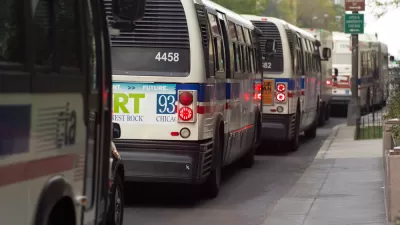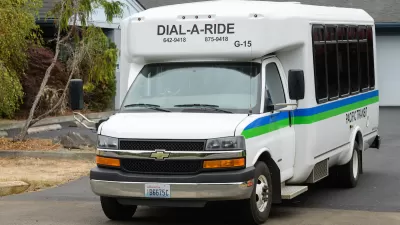A new report warns that microtransit is nothing more than a taxpayer funded Uber with potentially dangerous consequences for existing traditional transit services.

Microtransit pilots and programs are popping up across the country. But, Streetsblog’s Kea Wilson reports, some transportation experts are sounding the alarm that the promise of complementing or replacing traditional fixed-route vehicles with sedans, vans, or shuttles that offer door-to-door service is just “app-taxis by another name.” It’s too good to be true, according to a new report from the Amalgamated Transit Union, which shows that microtransit is already costing local transportation agencies two to three times more per passenger than their worst-performing bus routes on average.
The report outlines additional cracks in microtransit’s veneer:
- Few passengers are actually going anywhere near each other at the same time, meaning the majority of rides are single-person.
- As popularity rises, as it’s bound to for “dirt-cheap, mostly private chauffeur service,” agencies are forced to raise fares or deny requests for rides above their capacity.
- Data from several cities show microtransit is more likely to serve able, white-bodied affluent residents than BIPOC, disabled, and low-income passengers.
- Microtransit operations are often contracted out to private companies, who often don’t provide their part-time gig-worker drivers with basic benefits or guaranteed working hours and in some cases are requested to lease their vehicles from the company and pay for fuel out of their own pockets.
“Despite this, some agencies still choose to do whatever it takes to keep microtransit going — including cannibalizing funds from fixed route transit, accelerating a death spiral that's already been spinning faster since the pandemic,” Wilson writes.
Does that mean cities should avoid microtransit at all costs? The report author says not necessarily, but that it’s best for transit agencies to focus investments on their core service and reserve in-house micro-transit service in the limited situations that are worth a steep subsidy to decrease fares — such as “providing accessible paratransit vans to people with disabilities, piloting service in new neighborhoods that might someday get a dedicated route, and providing those elusive last-mile connections” — while paying drivers a living wage and benefits.
FULL STORY: Microtranist Is Taxpayer Funded Uber, Advocates Warn — And It’s a Threat to Real Transit

Planetizen Federal Action Tracker
A weekly monitor of how Trump’s orders and actions are impacting planners and planning in America.

Maui's Vacation Rental Debate Turns Ugly
Verbal attacks, misinformation campaigns and fistfights plague a high-stakes debate to convert thousands of vacation rentals into long-term housing.

San Francisco Suspends Traffic Calming Amidst Record Deaths
Citing “a challenging fiscal landscape,” the city will cease the program on the heels of 42 traffic deaths, including 24 pedestrians.

Amtrak Rolls Out New Orleans to Alabama “Mardi Gras” Train
The new service will operate morning and evening departures between Mobile and New Orleans.

The Subversive Car-Free Guide to Trump's Great American Road Trip
Car-free ways to access Chicagoland’s best tourist attractions.

San Antonio and Austin are Fusing Into one Massive Megaregion
The region spanning the two central Texas cities is growing fast, posing challenges for local infrastructure and water supplies.
Urban Design for Planners 1: Software Tools
This six-course series explores essential urban design concepts using open source software and equips planners with the tools they need to participate fully in the urban design process.
Planning for Universal Design
Learn the tools for implementing Universal Design in planning regulations.
Heyer Gruel & Associates PA
JM Goldson LLC
Custer County Colorado
City of Camden Redevelopment Agency
City of Astoria
Transportation Research & Education Center (TREC) at Portland State University
Jefferson Parish Government
Camden Redevelopment Agency
City of Claremont





























